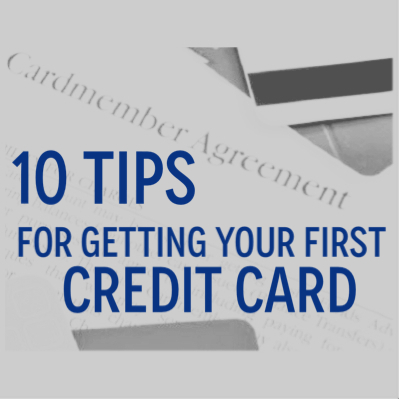
10 Tips for Getting Your First Credit Card

Getting a credit card can provide convenience as well as help you build up and maintain a strong financial history. Our guide can help you prepare for getting your first card, find the right offer for you and manage your card effectively.
1. Check and fix your credit history before looking for a credit card
2. Look for credit cards with lower interest rates and fewer fees or penalties
3. Evaluate the costs and benefits of rewards programs
4. Determine if you need a co-signer
5. Know the protections you have as a credit card holder
6. Use the best practices for managing your balance
7. Ask for a lower interest rate
8. File a complaint if you are a victim of unfair fees or deceptive marketing
9. Avoid credit card fraud
10. Immediately report any suspected credit card fraud
Check and Fix Your Credit History Before Looking for a Credit Card
Two steps may help you get a better deal when you look for a credit card because the condition of your credit, or how risky you seem to credit card companies, affects what kind of offer you may receive.
- Get your credit report, which is free as required by law:
Your credit report contains information on your financial behavior including how frequently you pay bills on time, how much credit you have available to you, how much credit you are using, what kinds of credit you use and your history of debt collections, debt settlements or other public records, including bankruptcy or any liens filed against you. By law, you can get a free credit report by visiting www.AnnualCreditReport.com or by calling 877-322-8228 or even by mail. To get a free credit report by mail, complete the Annual Credit Report Request Form and mail it to: Annual Credit Report Request Service, P.O. Box 105281, Atlanta, GA 30348-5281. Through this site, you can get one free report per year from each of the three national credit reporting companies (Trans Union, Equifax and Experian). The companies may try to “upsell” you to also purchase their over-priced credit monitoring services, or to buy a credit score. Just say no. - Fix any errors on your credit report:
Errors on your credit report can cause you to be mistakenly denied a credit card or charged a higher rate of interest.- First, do not go to a credit repair doctor , these are firms that promise to fix mistakes; they will just waste your money. These firms claim the ability to delete accurate but negative items. They cannot. You can just as easily fix inaccurate items yourself, but accurate negative items can only be removed with the passage of time. They generally can remain on your report for seven years, but each year, they count less in developing a credit score.
- Second, carefully document every error and do your best to gather evidence that proves it is an error.The Federal Trade Commission (FTC) indicates the step-by-step process you can use to fix errors in your credit report:
—To get started, you can use a sample letter provided by the FTC here. Your letter should indicate exactly what information on your credit report is wrong and show the evidence you have proving it is wrong.
—Make copies of your evidence (such as receipts showing bills you paid) and include that evidence along with a copy of your credit report with your letter. Itemize each of the errors in your report, do not simply give a general description to cover all the errors.
—Request in your letter that the incorrect information be removed from your report or corrected.
—Before you send your letter, make sure that you have made a copy of your letter and any evidence you have included in the letter. Keep the originals of your evidence, only send copies.
—Finally, send your letter to both the credit bureau and the lender or other information provider in question by certified mail, “return receipt requested”, and keep your receipt because this will allow you to show that the credit reporting company and lender received your materials.
—This process could take 30-60 days so start early
—It is particularly important for young people or others new to the credit marketplace, to fix errors. If you have fewer types of credit, such as a car loan and student loans, then each mistake will have a more significant.
Look for Credit Cards with Lower Interest Rates and Fewer Fees or Penalties
The following are some of the top details to look for in a credit card offer:
- An APR of 15% or lower: APR (annual percentage rate) is the interest you pay on the unpaid balance you owe on your credit card. In other words, the higher the APR, the costlier your credit card will be, if you carry an unpaid balance. However, if you are a convenience customer who pays her card off every month, and who can avoid credit card interest and debt, other features of the card, such as rewards, may matter more to you. Most credit cards have a grace period and do not impose any interest on cards paid in full (paid in full means that the entire balance owed, not just the minimum payment, is paid each month by the due date).
- A fixed APR at a good (15% or lower) rate if you can find it: Look for offers with a low APR, meaning that the rate will not change as frequently as with what is called a “variable APR” in which your rate is linked to an index. With a fixed APR, your credit card company must notify you about a change to your rate and can only apply the higher rate to transactions made after that notice. Fixed APR offers are harder to find but they can be worth the search.
- Lower and shorter-term penalty APR: if you miss a due date for a payment or meet other conditions your contract, you may have to pay a penalty APR. Compare these rates, what triggers them and how long the penalty lasts between credit card offers.
- No annual or monthly fees: Some consumers may choose to get a rewards card, often with an annual fee. The most common useful cards with annual fees are airline cards that build up miles or help frequent travelers avoid the new baggage fees. But, in general, unless you only qualify for a high-cost sub-prime card, you should be able to find cards, even with rewards , that have no annual or monthly fees.
- No dramatic increase in rates after the first 180 days of getting a card: Read your contract carefully to make sure that the advertised APR does not increase dramatically after the first 180 days, or what is sometimes called the “introductory rate” or the “teaser-rate.”
- A penalty rate that goes away sooner: If you miss a payment on your credit card, you will likely pay a late fee and may also be charged a higher interest rate on purchases made after that date. This is called a “penalty” or “default rate.” If you are more than 60 days late in paying, the company can raise your interest rate on existing balances, too. However, there is variation among credit card offers as to how long you will pay a penalty rate. If you make six on-time payments, your APR on your previous balance should be reduced to the old rate. But, while credit card companies are required to review your rate increase every six months, they are not required to reduce your rate on future purchases after 6 on-time payments. Ask if your credit card offer includes terms that would reduce your rate in this way.
Evaluate the Costs and Benefits of Rewards Programs
Credit card reward programs can be enticing as they allow you to earn things like airline miles, cash or meals. However, the conditions required to earn the benefits of some reward programs can end up costing you more than you get in return. Many rewards programs come with a monthly or annual fee on your card. If your reward program requires or encourages you to use more than 30% of your credit limit, this will hurt your credit and may cause you to face higher interest rates in the future. Check any rewards program you may be considering for what its conditions are and then weigh any costs such as what you would pay in higher interest against how much you want the reward. For example, you might ask yourself if a 1% or 2% reward on purchases are worth the cost if you are paying interest on a high balance at a rate of 15% or more each year.
Determine if you need a co-signer
Many consumers may need to have a co-signer, someone who assumes joint responsibility for their debt, when applying for their first credit card. If you are under 21, you may need a co-signer, if you cannot demonstrate an ability to pay due to some other source of income or savings.
If you are asked to co-sign for someone else, be careful as you will be fully responsible for those debts too.
Know the Protections You Have as a Credit Card Holder
Knowing your rights as a consumer can help you determine whether you have a bad credit card plan. In 2010 consumer protections for credit cards increased thanks to the Credit CARD Act. The following are some of the top consumer protections for credit card holders:
- If you lose your credit card or if it is stolen, once you report this loss to your credit card company, you are not responsible for any fraudulent charges on that account. Regardless of when you report your loss, however, you can only be liable for $50 of any fraudulent charges on your credit card.
In contrast, if you suffer fraudulent charges on a debit card you may be liable for all the money charged to your account if you do not immediately notice and alert your debit card carrier and even if your money is eventually returned, you will may not have access to your funds while your debit card carrier investigates. - Credit card companies cannot increase your APR during the first year you hold your card, unless you have a variable APR, your introductory rate ends (after 6 months or you are more than 60 days late on a payment.
- Credit card companies can’t increase interest rates on existing balances unless the current payment is 60 days late.
- Credit card companies must mail you your bill at least 21 days before the due date so that you can pay it on time. You also have the right to select your due date which cannot change.
- Each credit card statement must indicate in a Payment Warning notice how many months and years it will take to pay the current balance as well as the total interest that would accrue if only the minimum payment is made.
- Your credit card company must give 45 days advance notice of adverse changes in terms, and the right to opt-out before incurring new fees. However, this is not true if you have a variable APR.
- A credit card company cannot require you to fill out credit card applications as a condition of obtaining things such as “free pizza” or other cheap trinkets at or near on-campus marketing tables. However, the card company can offer other “intangible” benefits to applicants, such as special rewards or an interest rate discount. Still, anyone who stops at the table can get the free pizza, mug, t-shirt or other items on offer.
- Under the Truth in Lending Act’s provision called the Fair Credit Billing Act, credit card users have strong rights to ask their credit card company to help them dispute payment for products that don’t arrive or don’t work. Credit card holders also have very strong protections for correcting errors in billing.
Use the best practices for managing your balance
- Take advantage of text message alerts: One of the best ways to stay on top of managing your balance is through text alerts or emails. Many credit card companies offer free text alerts about your account activity, though you may still pay charges to your phone company for the texts. Through text alerts you can receive:
- Balance notifications: telling you your current balance, alerting you when your balance is approaching your card’s credit limit and when your balance exceeds a certain amount, that you can sometimes set so that you are alerted before your balance approaches your limit.
- Payment notifications: when a payment is due, received or past due
- Statement notifications: inform you when your statement is available online
- Over credit limit notifications: inform you when your balance is equal to or above your total credit limit.
- Pay your balance in-full and on-time every month.
Make your payments as early as you can each month so that you are more likely to avoid late charges. Fees and higher interest rates can be imposed on you if you pay your balance late, after the “grace period” or the number of days you have to pay before you are charged. Your grace period is listed in your credit card statement. Payments made before 5 PM on the day your balance is due cannot result in late charges. If you pay less than the full debt on your account each month, it will cost you more money because of the interest rate on your card, particularly if you only pay the monthly minimum. If you cannot afford to pay the full balance, pay as much as you can afford. Making a habit of at least paying double or triple the modest minimum payment helps, but the more you pay, the less credit card debt will pile up. The Federal Reserve Board offers a tool where you can calculate how long it will take you to pay off your credit card debt if you only make the minimum monthly payment and also how much it will cost you in interest. The Minimum Payment Warning on your statement each month also explains this. - Set your due date for the time of the month easiest for you to pay it. You can set the day of the month when your balance is due to be paid. Choose a date after the time of the month when you have the most funds available to you, for example after you are paid, so that it is easier for you to make your payment on time.
- Do not use more than 30% of the credit limit on your card. Using more than this amount of your credit limit can hurt your credit score or rating, cause you to pay more in interest and make it harder for you to get loans in the future.
- Set up an auto-payment of your monthly minimum payment. This can help prevent you from missing a payment should you happen to forget to manually pay. However, you should also make an additional manual payment of as much as you can afford each month.
- Check your credit limit in each statement from your credit card company. Your credit limit can change frequently. The best way to know that you are under 30% of your credit limit and not hurting your credit is to check your credit limit each time you get a statement from your credit card company.
In some surveys by consumer advocates, as many as half of people who asked to lower their interest rate were successful, sometimes lowering their rates by more than a third. To ask to lower your rate, call the customer service number on your card.
File a complaint if you receive unfair fees or deceptive marketing
You may be able to get help and potentially compensation if you were charged unfair fees or received deceptive marketing materials. To learn if your situation may enable you to get compensation, file a complaint with the Consumer Financial Protection Bureau, which helps document problems with credit card companies and get answers for consumers, typically within 60-75 days of the complaint being filed. Anytime your credit card company won’t fix a problem, tell the CFPB.
The best single way to protect against credit card fraud is to check your account a couple times per week to check for any unauthorized charges. There are a few more steps, as recommended by the Federal Trade Commission that can help in preventing fraud:
- Shred any unwanted prescreened credit card offers you receive as they can contain sensitive financial information.
- Save your receipts to keep track of your purchases
- Notify your credit card company when you are going to change addresses or when you will be traveling
- Never sign a blank receipt
- Draw a line through any lines you leave blank on a receipt
- Don’t give your credit card to any company on the phone unless you’ve dealt with them before or looked them up online.
- Remember that your rights as a credit card holder are very strong but your debit card rights are not. If you can avoid the risk of credit card debt—use credit cards—not debit cards, for retail, and especially for online purchases.
Immediately Report Any Suspected Credit Card Fraud
Call your credit card company’s customer service phone number and report any charges that you suspect are fraudulent. Once you have reported fraud or a loss of a card you are no longer liable for any charges on that card. Still, you can only be liable for a maximum of $50 of fraudulent charges on your credit card.
Topics
Find Out More


Trouble in Toyland 2023

VR risks for kids and teens

